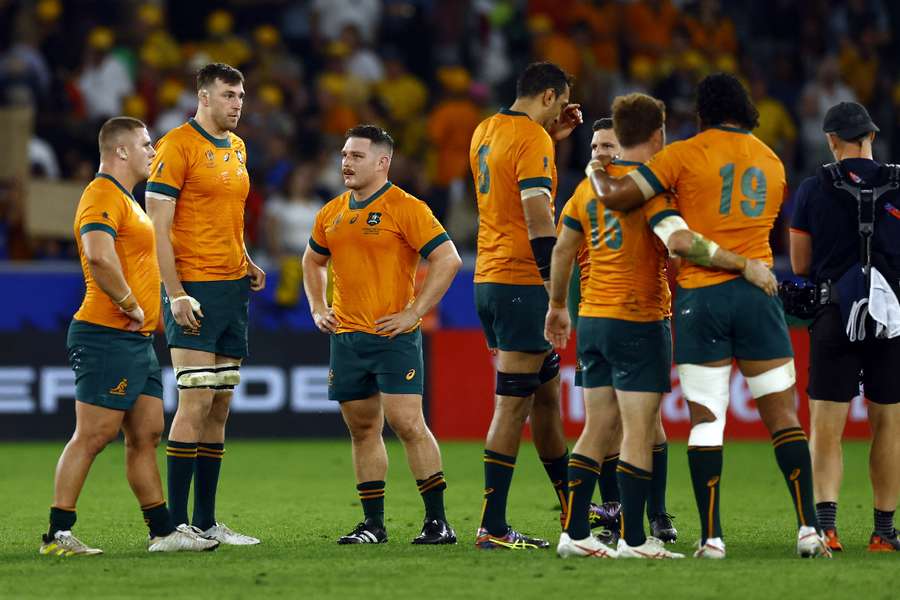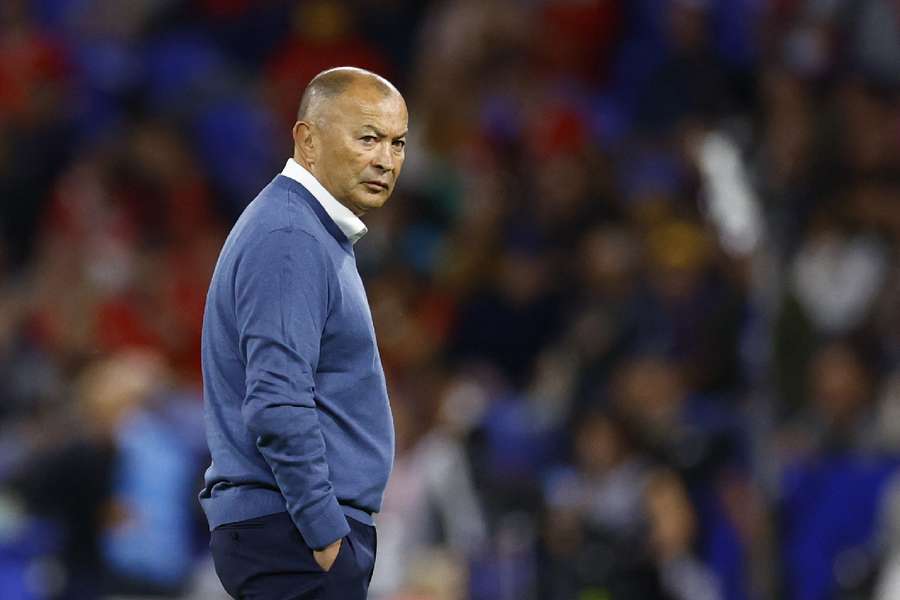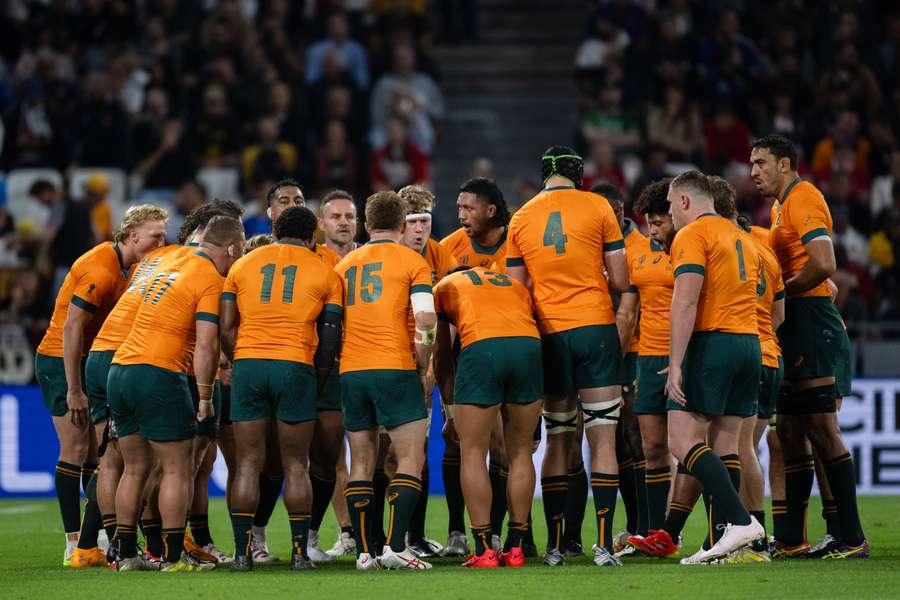Results aside, the second Jones era of the Wallabies looks to be coming to a swift and somewhat depressing conclusion as reports abound that the coach is already in the advanced stages of agreeing a return to lead Japan.
This is a shock as Jones was brought in on a contract that would see him take the Wallaby reigns until the end of the next World Cup - to be held in Australia in 2027.
Say what you will about Jones, his levels of commitment to the role (I’ll reserve judgment until more is revealed), his prickly media persona or his controversial selection choices - it’s fair to say that this tenure in charge of the side has been a flop.
Since he replaced previous head coach Dave Rennie in January, he has overseen seven losses - including to Fiji and Wales at this World Cup - and just two wins - against Georgia and Portugal (also at the World Cup).
It was hard to gauge the side against the likes of New Zealand and South Africa in the recent Rugby Championship as they are much stronger teams but the disastrous World Cup run has exposed his side for what they are - one that can no longer compete with the world’s best.

Could’ve, would’ve, should’ve
Sports is littered with impossible hypotheticals and the age-old questions of ‘what if?’ And hindsight, as the adage goes, is always 20/20.
It’s easy to look at the rather risky Jones experiment executed by Rugby Australia and ask - what were they thinking?
Or equally, what was Jones thinking in axing some of the elder statesmen in the side (namely Michael Hooper and Quade Cooper) and taking such an inexperienced squad to a World Cup?
However, there was enough evidence to suggest that the Wallabies were on a steady decline before Jones came in. That’s precisely why he was approached. Having said that, it’s also fair to say that the gamble in appointing him, and the gambles he made in his squad selection didn’t quite pay off - not in this World Cup, at least.
If the idea was to prepare for the next World Cup by blooding new talent, it could be argued that the confidence-shattering results in France might have done more harm than good.
Time will tell on that matter.

To be completely even-handed, Jones did have his fair chunk of bad luck in the tournament in losing two of his best players - captain Will Skelton and prop Taniela Tupou - before the Fiji game.
It’s reasonable to wonder - what if Tupou and Skelton hadn’t gotten injured? Do they then beat Fiji? Do they then scrape through to the final eight of the tournament and is the current crisis suddenly averted or rather ignored?
There are plenty of sliding-doors moments to consider, for sure, but those thoughts might distract from the more fundamental issues.
The problems with the team run much deeper than Jones, who he selected, who he didn’t, and who got injured along the way. And just maybe, plummeting to the depths of their worst-ever World Cup was necessary to truly bring the Wallabies’ woes to light.
A dearth of talent
I was (un)lucky enough to be in Lyon for the loss to Wales and something telling happened on the afternoon that we were travelling to the stadium.
While boarding the metro we met an Australian schoolboy rugby team on tour. They were players from a school with a strong rugby tradition in Australia’s capital - Canberra.
Funnily enough, my father, who was with us, went to and played for the same school's team many moons ago - a nice topic for conversation but that’s beside the point.
Talking to one of the team’s coaches, I quipped, in reference to the Wallabies' lack of depth at fly-half: “Have you got a good 10? You might want to let Eddie Jones know he’s in town!”
The coach retorted: “We do. But he’s already signed with the Raiders.” That’s Canberra’s National Rugby League (NRL) franchise. For the record, the player was signed when he was 15.
For better or worse, you cannot talk about rugby union in Australia without touching on the NRL. League has by far the bigger professional operation of the two rugby codes in the county and when you throw the AFL into the equation as well, the maths is simple when it comes to the talent acquisition question for Australia's major winter sports.
The NRL has 17 franchises while the AFL has 18. Australia has just five franchises in rugby union's multi-national Super Rugby competition - two of which finished in the bottom three of the last season.
Union simply cannot compete when it comes to ring-fencing the best young talent at the critical ages and that has been a discussion for years.
Rugby Australia has been coaxing players over from the NRL to boost their stocks for a long time now. Wendell Sailor, Lote Tuqiri, Matt Rogers, Israel Folau and current Wallaby Suliasi Vunivalu all made the move to union from league.
The next big defector is Sydney Roosters’ star Joseph Sua'ali’i, who is set to begin life with the NSW Waratahs in 2025 with sights set on representing (read: resurrecting) Australia at the home World Cup two years later.
The lack of talent in Australian rugby isn’t a new problem but with the help of a few key converts, the Wallabies have kept scraping by with largely passable albeit dipping performances. Until now.
What’s become clear in the last year and most starkly in France is that the Wallabies cannot currently compete with the best rugby nations on the pitch. How much of that is down to Jones’ rollercoaster ride in the hot seat since January? Probably not as much as the headlines would suggest.
The task going forward is to ensure that there is a competitive crop of talent coming through the rugby pathways in Australia, landing in the franchises each Super Rugby season and battling out for selection for the Wallabies.
How to make that happen consistently and effectively? Well, my advice would be to sign as many players from the NRL as possible and see who sticks. But there’s a reason why I’m not in charge.
While it’s unclear just how to best restore the Wallabies to the top table of international rugby, one thing is for sure - whoever comes in to lead the team if or rather when Jones departs will have one hell of a job to revive the side and get the public re-engaged and believing ahead of the 2027 World Cup.





